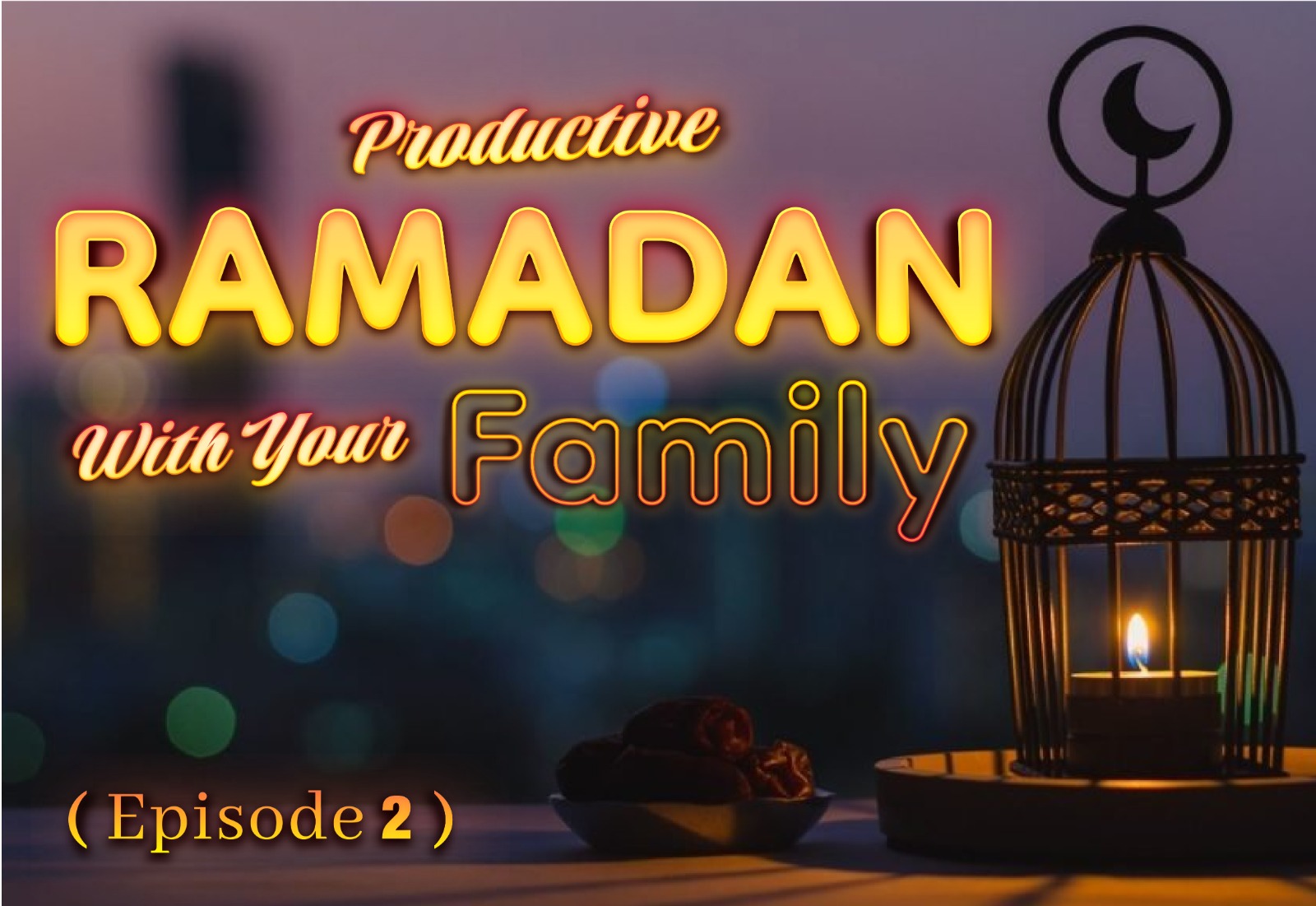Bismillah WalHumdulillah
In the last episode, we discussed the reasons why Islam has ranked Ramadan as a special and blessed month. Today, we shall discuss what acts need to be carried out in this month. We will also talk about how we can incorporate them in our lives and also carry our families on this journey with us.
The main and most important as well as exclusive form of worship for this month is fasting for Allah (عَزَّوَجَلَّ).
The word ‘sawm’ in the Arabic language means ‘to abstain.’ ٰ Arabs say: صامت الخیل (saamatil khayl) which means that ‘the horse has stopped.’ Hence, sawm (fasting) is derived from this definition and implies that all those acts a person can normally carry out in their life is to be abstained from. The time has also been defined as starting from when the sun rises to when the sun sets. A person holds himself back from even the permissible acts during this duration.
When Allah (عَزَّوَجَلَّ) mentions the month of Ramadan, He mentions the obligation to fast.
يَا أَيُّهَا الَّذِينَ آمَنُوا كُتِبَ عَلَيْكُمُ الصِّيَامُ كَمَا كُتِبَ عَلَى الَّذِينَ مِن قَبْلِكُمْ لَعَلَّكُمْ تَتَّقُونَ
O you who have believed, decreed upon you is fasting as it was decreed upon those before you that you may become righteous –
[Surah Al-Baqara: 183]
We learn that fasting is not just for the Ummah of Muhammad ﷺ but it was also prescribed in the Shariah of the previous nations. We do not know how it was carried out then, but we do understand that the previous prophets practiced fasting also.
The question that arises is, why was fasting made obligatory? Was it done so we remain hungry for many days? Is that the purpose of fasting and for our foods to be taken away? No, the purpose has been defined as:
لَعَلَّكُمْ تَتَّقُونَ
you may become righteous
What is righteousness? Righeousness in a person or having taqwa is for him to follow the commands of Allah ﷺ and to abstain from what Allah (عَزَّوَجَلَّ) has forbidden.
There may be several instances in the day when a person can hide and eat or drink but he does not because he is aware that Allah (عَزَّوَجَلَّ) is watching him. To eat or drink anything would be to break this act of worship that requires a person to abstain and remain hungry. This person becomes mindful of the fact that there are a few conditions that break the fast.
This mindfulness or haya is a training ground for this month and is to be carried forward in the remaining eleven months so that we become aware of our actions and know that we are being seen by Allah (عَزَّوَجَلَّ) at all times. This is for us to practice that even if the impermissible comes in front of us, we find the ability to stop ourselves from indulging in it. Not only do we stop ourselves from the wrong, but we become the ones who implement Allah (عَزَّوَجَلَّ)’s action and do the right. This is the training that is required of us and also the purpose of fasting during the month of Ramadan.
There are several health benefits to fasting. Many doctors and qualified individuals have always advised to reduce the quantity of food intake if the body is to be kept healthy and sound. Imam Shafi (Rahimullah Alaihi) explains that he has lived sixteen (16) years where he has not had a meal that fills his stomach completely. Eating a full meal bloats the stomach and also affects the mind. The sleep and lethargy increases as a result. Bloatedness, inefficiency of the mind, increased sleep and having a lack of energy are all factors that affect us negatively. Hence, to fast for Allah (عَزَّوَجَلَّ)’s sake not only brings our spirituality to a higher level but also provides us with a healthy body.
Sharing the goodness of Ramadan with your family
The idea is to share the rewards of fasting with your family by presenting to them what they will gain other than discussing what is to be eaten at suhur and iftar. If a child is asked what it means to fast, a typical reply would be: Sehri (to eat in the morning), iftari (to break your fast) and to stay hungry. Here is where we need to remind our children that the purpose of fasting is to obtain taqwa (to become mindful that Allah (عَزَّوَجَلَّ) is watching us).
Our children should be told that when a person fasts, his duas are accepted. Allah (عَزَّوَجَلَّ) does not reject the prayers of a fasting person. The reward for righteous deeds is multiplied. It should be shared with the kids that there is a need to stop oneself and practice sabr (patience). If a person fights with you while you are in a state of fasting, you are not to retaliate. Rather, the response of a fasting person in such an occasion is to say:
إني صائم
“I am fasting.”
In a hadith we learn, Abu Huraira reported: The Messenger of Allah ﷺ said:
“If anyone abuses him or fights with him, he should say twice: Indeed, I am fasting.”
(Ṣaḥīḥ Muslim 1151)
It is necessary that we share the holistic purpose of fasting with our family and move beyond from just abstaining from food and water.
Do not spend your fast sleeping
Many a times, people think that sleeping during a fast will also be considered a form of worship. Hence, they spend most of their fasting day sleeping. This by no means is a state of worship. This is a deception. If we just want to spend the time so the day goes by and it is time for iftar, then where is the spirit in the fast? Where is the love for this act of worship? We must try to utilize this act of worship in the best manner that we can.
Recognize the blessings Allah (عَزَّوَجَلَّ) has given
Another aspect of fasting can be to recognize the blessings that have been given to us. When we are made to be deprived of them, we suddenly realize their value. Imagine the poor people who do not have even the basics of food and living standards that Allah (عَزَّوَجَلَّ) has blessed us with. Think of the needy at this time. The people who are very similar to us, are in a state of trial. They do not even have sufficient food to eat. Alhumdulillah, we are blessed and we can afford not only food but all other necessities also, not just for one day but months to follow.
Develop a relationship with the Qur’an
Another important act of worship during the month of Ramadan is to build our relationship with the Qur’an. This is the month to recite the Qur’an and do tilawah. This is the month to reflect upon the verses of the Qur’an and do tadabbur. Listening to the Qur’an is also recommended during this month. These three aspects with respect to the Qur’an need to be implemented this Ramadan.
Why is this so? Allah (عَزَّوَجَلَّ) explains in the Qur’an:
شَهْرُ رَمَضَانَ الَّذِي أُنزِلَ فِيهِ الْقُرْآنُ
The month of Ramadhan [is that] in which was revealed the Qur’an
[Surah Al-Baqara: 185]
This is the very month when Qur’an was revealed. This is the beauty of this month. What is this Qur’an and what is it like?
هُدًى لِّلنَّاسِ وَبَيِّنَاتٍ مِّنَ الْهُدَىٰ وَالْفُرْقَانِ
a guidance for the people and clear proofs of guidance and criterion.
[Surah Al-Baqara: 185]
Qur’an has been called ‘The Furqan,’ the one that distinguishes between the haq (right) and batil (falsehood). Qur’an explains the right way and what is to be followed. It explains the falsehood and that we need to stay away from it. Hence, the month of Ramadan is the month of Qur’an.
The Prophet ﷺ used to recite the Qur’an immensely during this month. In fact, Jibrael (عَلَيْهِ ٱلسَّلَامُ) used to meet the Prophet ﷺ every night in Ramadan and did a ‘daur’ (revision) of the Qur’an. You may have observed those individuals who have done hifdh of the Qur’an (memorization of the Qur’an), when they meet, they revise their Qur’an. Similarly, Jibrael (عَلَيْهِ ٱلسَّلَامُ) would meet the Prophet ﷺ to revise whatever of Qur’an had been revealed up until that year.
When this happened, the Prophet ﷺ increased in acts of goodness. The Companions of the Prophet ﷺ said that the Prophet ﷺ increased in his charity and all other good deeds, he fasted and guided others. He increased his duas and his adhkar (remembering Allah (عَزَّوَجَلَّ). Hence, we learn that when he connected himself with the Qur’an in this manner of revising it, he increased in doing good deeds also.
We should also aim to build our relationship with the thirty (30) Juz of the Qur’an in these thirty (30) days. We need to make a firm promise to ourselves that we will recite one juz a day. We can easily keep half an hour aside for this. You can pick and choose a time that is convenient for you. This can be your recitation resolution. Then you can decide on listening on one juz in taraweeh each night. That will cover the listening aspect of connection with the Qur’an.
Involve Your Children
How shall we involve our children in this act? The children can also be given a task to recite certain number of pages as per their schedule. Another way to involve the family is to recite in a place where there are people constantly coming and going, like the lounge. Your children will witness your recitation and think that this is an additional part of the parent’s routine. They will notice that you are paying more attention to Qur’an and its recitation. Your actions will be more powerful than your verbal instructions.
Another thing to do is to keep yourself and your children in check with the progress of the Qur’an. Usually people start out with a lot of energy and then as days of Ramadan go by, we fall short of our own schedule. We are busy with the iftari preparation or attending an iftar invite by family. We have to be mindful of our routine that we have promised ourselves we will follow this Ramadan.
Remember, Shaytan is after you to derail you from your worship this Ramadan. Hence, we need to overcome the weakness and try to do our best to fulfill these acts of ibadah asking Allah (عَزَّوَجَلَّ) for more such opportunities to perform good deeds.
May Allah (عَزَّوَجَلَّ) give us the ability to make use of the two acts discussed here ie. To fast and recognize the purpose behind fasting and to recite the Qur’an. Aameen
Wa Akhiru Dawana Anilhamdulillahe Rabbil A’lameen
This has been transcribed and translated from this video given below.











